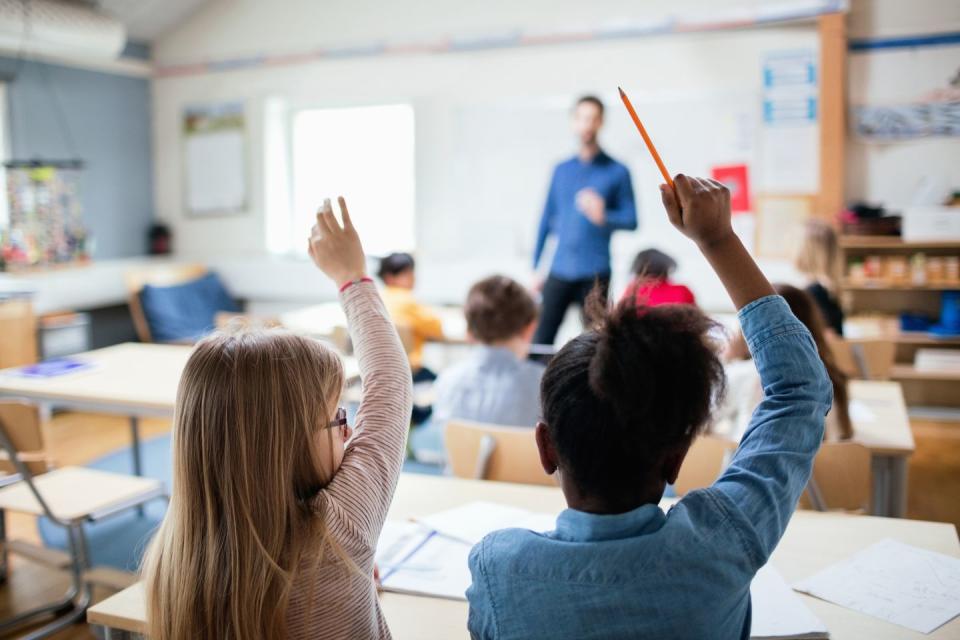This is how sex education in UK schools is going to change

For years, we've had an antiquated sex and relationships education curriculum which too often just focusses on avoiding sexually transmitted diseases and/or pregnancy. While this is obviously important for young people, so too are plenty of other sex-related things like consent, porn, sexting, body image, contraception (in terms of finding the right one) and both healthy heterosexual and LGBTQ+ relationships.
Today, the government has announced what it want to see added into a new, updated sex and relationships curriculum.
This has been in the works for over a year when the previous education secretary Justine Greening pledged to make sex education compulsory and update the curriculum, which has not been changed since 2000. There was then a call for evidence where 23,000 activists, teachers, parents and pupils all gave their thoughts on what needed to be included.
This modernised curriculum is now subject to a consultation from teachers, parents and young people, and the government hopes to roll it out across the UK by 2020.
Let's see what they want to see included:
Who will receive the education
It's completely baffling that sex education is still not compulsory. So, first things first, the government says it will change this. Sex education will become mandatory in all secondary schools and relationships education will become compulsory in primary schools, meaning children will learn about building healthy, respectful relationships both on and offline, with family and friendship as a focus.

Consent
A conversation about what exactly consent is, for both girls and boys, has been much-needed for a a long time - but in the age of #MeToo, it really could not be more timely. The government says young people will be taught the concepts of consent and how to deal with peer pressure both on and offline. With the new curriculum, by the end of secondary school pupils should know that they have a choice to delay sex or enjoy intimacy without sex, and that there are a range of strategies for identifying and managing sexual pressures. The government adds that pupils should understand strategies to resist the pressure or not put pressure on someone else, and should recognise the signs of healthy relationships.
Body image
Compared to when the sex education curriculum was last updated in 2000, a lot has changed. One of the most major changes is the advent of social media. Platforms like Instagram and Snapchat have brought new challenges to ensuring young girls are secure in their bodies and aware of how a lot of what we see online is not authentic. The government says it recognises the recent "relentless pressure on young people to compare and share images of themselves" and say the new syllabus aims to "help children cope with the pressures and to understand the difference between images they see online and reality".

Sexting
Another fairly recent internet problem which can fall under the parameters of consent and harassment is sexting. The new proposals say pupils will learn that people often act different online and that "the same principles of respect apply to online relationships and face to face relationships". Secondary school pupils will also learn about the risk of revenge porn, they add.
Pornography
Accessing porn has never been easier due to the internet. But campaigners argue it can be damaging to brush this under the carpet without addressing it in schools, because if young people are watching porn - unaware that it's not representative of real life sex - this can be dangerous. Under the new guidelines, secondary school pupils will learn about "how sexually explicit material often presents a distorted picture of sexual behaviours, can damage the way people see themselves in relation to others and negatively affect how they behave towards sexual partners", the government says.
Fertility
When children hit secondary school age they will learn about reproductive health including fertility and the impact of lifestyle on men and women's fertility.

LGBTQ+
Same sex-relationships have long been neglected in PHSE at schools and have been one of the main campaigning points for this update. The government says primary school children will not learn about intimate LGBTQ+ relationships, just like they don't learn about intimate heterosexual relationships. However, they have said that in secondary school, pupils will learn about the different types of family set ups and the importance of respect and tolerance. They will also learn about different types of relationships including what marriage and civil partnerships are.
Mental health
Under the new plans, there is also going to be a compulsory 'health education' module which will include mental health, which we're glad to see as it's about time mental health is treated the same as physical health. Students will learn about how to recognise and talk about their emotions at a primary school level, and then at secondary school they will learn about recognising the signs of conditions like anxiety and depression.
This is definitely a welcome start and we're glad to see SRE getting a much-needed update. There's still more that needs to be done, however, and some campaign groups have criticised the fact that we still have two years to go until we see any of these changes happening in our schools.
You Might Also Like


